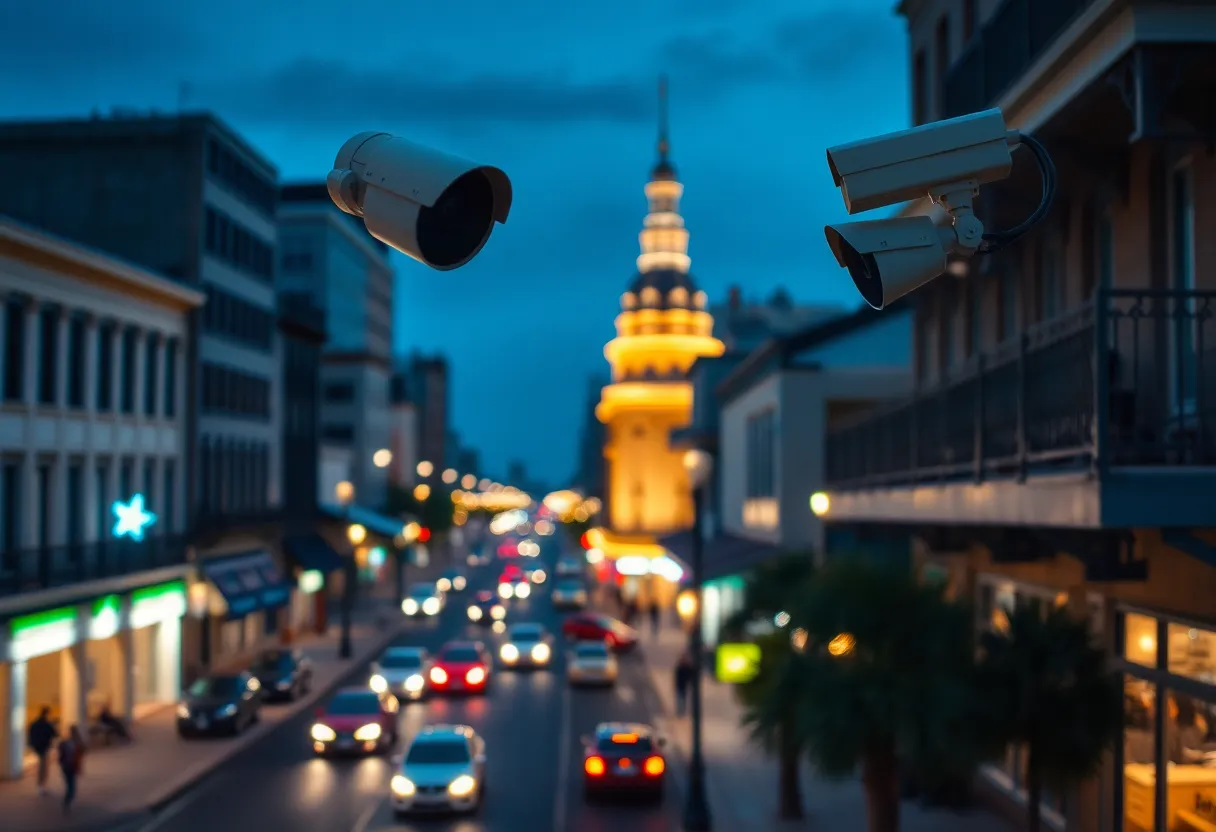News Summary
Christian Bert Fischer, a fugitive wanted for a sex crime involving a minor, was captured in New Orleans thanks to Project NOLA’s facial recognition technology. Fischer had evaded law enforcement for over a year, traveling across the country before being apprehended on Frenchmen Street. His case has sparked discussions about the effectiveness and ethical implications of facial recognition in law enforcement, raising concerns over privacy and surveillance practices.
New Orleans
Christian Bert Fischer, a 43-year-old fugitive from Florida, was apprehended in New Orleans on Thursday evening. His arrest was made possible by facial recognition technology employed by Project NOLA, which scanned its extensive surveillance camera network and flagged Fischer as a suspect wanted for a sex crime involving a minor.
Fischer had been a fugitive for over a year after skipping his trial in Hernando County, Florida. Law enforcement officials from the Louisiana State Police and U.S. Marshals arrested him in the 500 block of Frenchmen Street, later booking him into the Orleans Justice Center.
The successful identification of Fischer was part of a larger initiative that used facial recognition technology to track and capture wanted individuals. Prior to his arrest in New Orleans, Fischer had quite the journey; after initially being arrested in Florida in January 2022 for attempting to engage in sexual activity with a person he believed to be a 13-year-old boy, he managed to evade law enforcement by fleeing to locations across the country including California, Oregon, and Idaho.
During his earlier arrest, Fischer had communicated explicit messages to a decoy posing as a minor, and he was caught trying to meet up, bringing with him chocolates, candy, condoms, and an enema bag. This alarming behavior made him a high-priority target for law enforcement, which increased the urgency of his capture.
Project NOLA’s surveillance cameras played a crucial role in his arrest as they detected Fischer bar-hopping in the Marigny neighborhood. This advanced facial recognition system allows for the scanning of faces and matching them against a database of around 100 wanted individuals provided by the U.S. Marshals. When a potential match is found, law enforcement is immediately alerted via specialized applications.
The situation has reopened discussions among New Orleans officials regarding the implications of facial recognition technology. Privacy advocates are raising concerns that the increasing deployment of such technology could lead to potential over-surveillance and abuse of monitoring systems.
New Orleans currently operates a network of approximately 200 high-resolution cameras that utilize artificial intelligence to enhance crime-solving capabilities. In addition to Project NOLA’s resources, the New Orleans Police Department (NOPD) has its own cameras but is subject to a 2022 ordinance that limits their use. The ordinance stipulates that all alternative identification methods should be exhausted before resorting to facial recognition.
This recent high-profile arrest has led to scrutiny regarding the NOPD’s practices in relation to the regulations governing facial recognition technology utilization. While Project NOLA’s systems have purportedly aided in solving numerous homicide cases since their inception, the unfolding concerns about privacy and civil liberties have raised questions about their future in policing.
The Mayor of New Orleans and other city officials are currently engaged in discussions to consider potential updates to the city’s facial recognition policy aimed at improving transparency and oversight. In light of ongoing legal challenges and scrutiny, these dialogues are vital for balancing public safety with the protection of individual rights.
The American Civil Liberties Union (ACLU) of Louisiana has echoed the concerns regarding the inherent biases and legal ramifications that might arise from using facial recognition technology without adequate public awareness or implemented safeguards. As the debate surrounding this technology continues, the case of Christian Bert Fischer serves as a reminder of its complex implications in law enforcement.
Deeper Dive: News & Info About This Topic
HERE Resources
Girlfriend of Inmate Arrested for Aiding Escape from Orleans Justice Center
Daring Inmates Escape from Orleans Justice Center
New Orleans City Council Reassesses Facial Recognition Ordinance
Eight Escapees Recaptured from Orleans Justice Center
Jailbreak in New Orleans Raises Concerns Over Safety
Nine Arrested in Orleans Justice Center Jailbreak Case
New Orleans Advances Ordinance to Protect Sex Workers
Additional Resources
- WWLTV: Fugitive Sex Offender Captured
- NOLA: NOPD Suspends Facial Recognition Cameras
- Axios: New Orleans Police Use of AI Facial Recognition
- Washington Post: Live Facial Recognition in New Orleans
- Wikipedia: Facial Recognition System

Author: STAFF HERE NEWORLEANS WRITER
The NEW ORLEANS STAFF WRITER represents the experienced team at HERENewOrleans.com, your go-to source for actionable local news and information in New Orleans, Orleans Parish, and beyond. Specializing in "news you can use," we cover essential topics like product reviews for personal and business needs, local business directories, politics, real estate trends, neighborhood insights, and state news affecting the area—with deep expertise drawn from years of dedicated reporting and strong community input, including local press releases and business updates. We deliver top reporting on high-value events such as French Quarter Festival, New Orleans Jazz & Heritage Festival, and Essence Music Festival. Our coverage extends to key organizations like the New Orleans Chamber of Commerce and Greater New Orleans, Inc., plus leading businesses in energy, healthcare, and education that power the local economy such as Entergy, Ochsner Health, and Tulane University. As part of the broader HERE network, including HEREShreveport.com, we provide comprehensive, credible insights into Louisiana's dynamic landscape.

